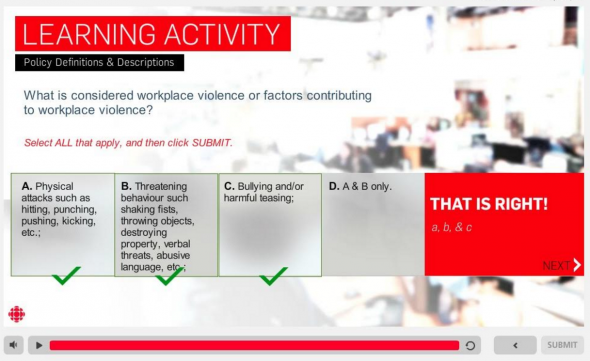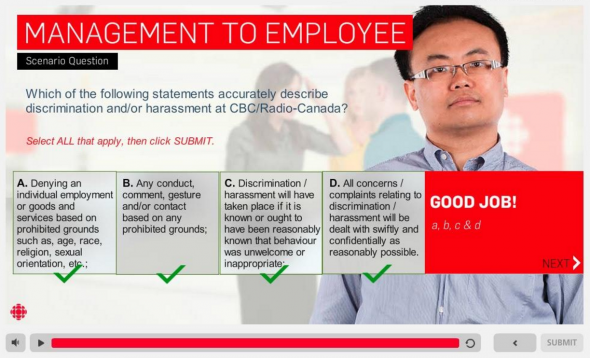Following the April 2015 release of the Rubin Report, which detailed workplace abuse and institutional failures at CBC’s Q, many internal changes are being championed by the public broadcaster. Bullying awareness posters are plastered throughout the halls and every employee must take online training to help prevent bullying and harassment.
In media interviews, CBC executives and spokespeople assure the public that institutional changes are taking place. They said they are doing everything they can to make sure the “toxic atmosphere” described by the team at Q can never happen again. In internal memos to all CBC staff, management said they are now “responding to complaints with renewed discipline and rigour” and CBC Head of Public Affairs Chuck Thompson said the CBC has “filled the gaps” that allowed Ghomeshi’s workplace transgressions to occur and go overlooked.
Thompson said, “I would like to believe that that would not happen ever again at the CBC, we have zero tolerance for it, and if it ever did we would be moving on it much, much more swiftly.”
But CANADALAND has learned of serious bullying, harassment, and workplace abuse complaints at the CBC, throughout its departments. Through conversations with over a dozen CBC employees, our investigation revealed that CBC Radio One, CBC TV Sports, and CBC human resources have all experienced, or are experiencing, allegations of workplace bullying and abuse.

CBC Radio’s flagship current affairs program As It Happens is known for its aggressive accountability journalism and for asking unflinching questions, sometimes posed to the CBC itself. This past winter, As It Happens producers began approaching the CBC’s union, the Canadian Media Guild, with serious workplace complaints. Soon, CMG Toronto President Naomi Robinson compiled a list of 21 allegations from “about a dozen” current and former As It Happens producers. No official union grievances were filed.
This document, taken from an email sent by Robinson, was provided to CANADALAND by two sources who asked to stay confidential to protect their careers. The CBC denies all of the allegations that follow.
———- Forwarded message ———-
From: Naomi Robinson
Date: Fri, Jan 8, 2016
Subject: Re: response
To: XXXXXXXComplaints coming from several staff at As It Happens (current & former)….
– Micro-managing work & a lack of trust in a way that undermines confidence
– Rude dismissals of story pitches (passive aggressive behaviour like eye-rolling)
– Yelling & accusations – verbal abuse & aggressive behaviour by senior team members
– Threats to not involve the union
– Being told not to take lunch breaks
– Accusations of not making the show a priority
– Racist and sexist attitudes
– Manipulative behaviour
– Preventing opportunities (outside AIH) & control over career development
– AP’s doing exactly the same thing as producers
– Favouritism of certain staff (especially those friendly with sr. team)
– Intimidation
– Integrity & abilities questioned
– Culture of abuse within leadership team for more than a decade
– No thanks or congratulations given on work
– Stress coming not from workload but working conditions that have lead to both menatl & physical health problems
– Isolated by constant critiquing
– Bullying
– Blame placed on producers in a non-constructive fashion
– Not treating staff with respect deserving of professional journalists
– False accusations of work issues
Naomi Robinson
CMG Toronto President
We spoke to seven current and former employees of As It Happens, all of them aware that human resources was reviewing the program. One of them was surprised about the severity of the allegations, but six others said they were familiar with the problems on the show.
None of the seven sources allowed us to use their names or include specific stories, fearing reprisal from the CBC. Speaking on background, we have confirmed the personal experiences they describe are in line with the complaints outlined in Robinson’s email. One said As It Happens “can be an abusive, terrible, manipulative workplace.”
Many of the sources were torn about speaking to CANADALAND, unsure of whether it will improve the work conditions. They said they were committed to their work and expressed their love for public broadcasting and a desire to help, not hurt, the CBC.
“I do understand it’s a deadline-driven workplace, tempers are going to flare,” one of our sources said. “That’s totally normal when you’re on air every day and stress is running high. But I don’t think that by itself it’s something people would really have complaints about.”
This was a common sentiment among sources we spoke to. They have all previously worked in journalism and said the problems at As It Happens went well beyond the high-pressure, stressful environment of a typical newsroom. Behaviour on As It Happens “crossed the line,” according to several people we spoke to. All were aware of employees who, as a result of these issues, left the program, went on stress leave, or left the CBC entirely.
Once HR found out about the severity of the complaints, they gathered the AIH team and informed them about the review taking place. At the time, CMG was gathering complaints made by former and current employees, spanning years into the show’s history.
Soon after the team was informed that As It Happens was under HR review, co-host Carol Off took three days off the show. She was absent February 3–5.
CANADALAND wasn’t able to confirm whether her absence was planned, but immediately afterward the HR review was drastically scaled back to only include current employees, and participation became voluntary.
Earlier this month, HR concluded that As It Happens is a “typical workplace,” a result senior staff learned about a week before the rest of the show’s employees. No word was given to complainants about whether their specific claims were found to be valid or not. Some of the staff who participated in the initial, full review, were never notified about the outcome.
We asked As It Happens co-host Carol Off, Executive Producer Robin Smythe, and Senior Producer John Perry about the allegations in Robinson’s email and posed individual questions to all three about specific allegations against each. One of the questions to Off was about her February absence. They responded together, in one email, saying they had never seen the allegations until CANADALAND brought them to their attention.
In that collective email, they said, “We had no knowledge of this list, and we have no idea what purpose it served, if any. We have never seen it nor been presented with these allegations.”
They categorically denied the complaints, writing that “The allegations in this note are hurtful, untrue, baseless, damaging and defamatory. To disseminate these allegations, or any similar allegations, would be indefensible from an ethical point of view, and libellous.”
Their full response can be read here.
We also reached out to CMG and the CBC. Emails from all three parties arrived within minutes of one another.
CBC spokesperson Chuck Thompson directly contradicted Off, Smythe, and Perry’s claim that they were “never presented with these allegations.” He confirmed to CANADALAND that conversations were held about the allegations “which included Carol Off, Robin Smythe and John Perry.”
Thompsons’s full response to us can be read here.
Thompson also wrote that because no official grievance was filed, there was no official investigation into As It Happens. He said there was no “formal review” and instead called it a “series of informal conversations.” However, CMG union president Carmel Smyth characterized it as a “review.” In contrast to Thompson’s claim, she said the union has a “strict policy” and urged the CBC to conduct this review as a matter of “process.”
Smyth’s full response can be read here.
Other discrepancies emerged. As it Happens’ show leaders and the CBC’s Chuck Thompson deny all 21 of the allegations made by more than 10 of their colleagues, writing that they are all “baseless and untrue.”
Yet Thompson also said that as a result of the As It Happens team’s complaints, the CBC “found some areas we could work on” (he did not specify which). As It Happens leadership will receive additional management training as a result of the complaints, and CMG tells us that after the review of the complaints “CBC management committed to holding quarterly check-in meetings,” increasing the level of management scrutiny on the show’s workplace conditions.
Thompson stressed repeatedly that there has been no official grievance filed, saying those measures will be implemented “because we’re always looking to improve and strengthen our workplace culture. It’s precisely why we had these conversations, even in the absence of any formal complaint.”
But four of our sources said filing an official complaint can be dangerous. “I think the general understanding is filing a grievance is gonna bite you on the ass,” said a producer who worked on the show. To go through formal channels, they said, means to give up time and anonymity for an outcome that’s not guaranteed, putting a stain on your record.
CANADALAND asked the CBC why they think no official grievance was filed despite “about a dozen” complainants making 21 allegations, many of a serious nature. Thompson pointed us to CBC policy and said, “CBC remains committed to fostering a safe and respectful working environment and any matters that we do deal with are handled in a fair, thorough, and confidential manner.”

Last summer, after a year of scandal and in the midst of dire cutbacks, the CBC got an exclusive opportunity on a prestige event: they were the host broadcaster of the 2015 Pan Am Games. But after going to air, they faced immediate criticism from viewers and the media about their television coverage.
Behind the scenes, production was haphazard and chaotic, and workplace conditions were brutal. In at least one case, tempers boiled over.
CANADALAND spoke to three former TV contractors who worked on the games about the conditions. They all asked to remain anonymous for the fear of losing future work at the CBC.
Working long hours is nothing new for those in TV and film, but all three contractors told us the Pan Am games went beyond what they expected. It was common to work 16-hour shifts with no breaks, working on the footage late into the night.
All three sources said it was hard to access adequate food and water while working on-site. Because Pan Am security didn’t allow outside food or even water bottles to be brought in, workers had to fend for themselves. Many weren’t given food vouchers, had no access to the meal services designated for Pan Am workers, and didn’t take lunch breaks, so they only ate apples and granola bars provided by the venue. All three contractors said their experience wasn’t unique to them.
Because of the heat, the provided water bottles ran out quickly, leaving staff with purchasing water at expensive Pan Am prices as the only option to stay hydrated. One source reported developing a temporary health issue as a result of the conditions, only to be shrugged off when brought up to superiors.
Two of our sources expressed to us concern for the safety of a young female colleague who would end her shifts as late as 3am, after the public transportation she relied on for her commute to work had closed. No taxi expenses or alternate arrangements were made available by the CBC until the issue was repeatedly raised.
There was a general understanding that complaining about the conditions was futile and could endanger future contract opportunities. When one contractor brought up the lack of availability of food and water in the media tent, CBC management promised to see what they could do but there was no improvement until Parapan Am Games began.
One of the contractors who spoke to CANADALAND complained about both the working conditions and an instance of verbal abuse. Though CANADALAND has confirmed that the incident resulted in a formal apology, the employee accused of verbal abuse disputes the accuracy of the complainant’s recollection of the incident.
The alleged incident of verbal abuse, according to the complainant, took place in a cramped video editing booth, when she asked one of her CBC managers, Derek Furlong, for work-related help. She said they got into a back-and-forth and Furlong lost his temper, became enraged, encroached on her personal space and allegedly yelled at her “you know what? go fuck yourself bitch, fuck you, who do you think you are? Go back where you came from! You don’t know what you’re doing here. Fuck you!” The contractor said she felt threatened.
A witness of the altercation confirmed the manager screamed at the contractor, who immediately got in touch with HR.
The contractor filed a formal grievance with the union, triggering a human resources investigation. After a lengthy process, HR told the complainant she would receive an apology either in-person or over the phone. She told HR she didn’t want to be alone in the same room as Furlong but HR would not provide her with a written copy of the apology. The matter is now considered closed.
CANADALAND reached out to Furlong to ask about the allegations. He told us, “I can confirm that there are massive inaccuracies throughout your note. In fairness to my self, the matter in question was thoroughly looked after and closed last year following a full HR investigation.”
We followed up to ask what specifically was wrong or inaccurate but Furlong did not respond. Instead, CBC spokesperson Chuck Thompson wrote in an email “I can confirm there was a written apology from Derek Furlong shown to the other individual involved in the exchange.” We asked Thompson why the CBC did not provide her with a copy of the apology when she asked for one. He did not answer.
The complainant, who despite having extensive experience both within the CBC and outside it, is not optimistic she will work at the corporation again. She had verbal agreements to work with the CBC in the future, she said, but was not asked back.
We asked about CBC policy on employees and contractors facing retribution for complaining. Thompson linked us to the policy on their website, which says, in part, “If an employee raises a concern relating to discrimination, including harassment, in good faith, s/he will not be subject to retaliation or reprisals for bringing forward his or her concern.”

The CBC’s human resources department, tasked with handling all workplace bullying and harassment claims, is itself facing workplace bullying and harassment claims.
The CBC’s Director of HR is facing a formal workplace bullying complaint and has been on leave for seven weeks, pending the outcome of an investigation.*
The validity of the claim against her is disputed.
The former top executive of the department, Todd Spencer, was fired months after the Ghomeshi scandal surfaced. The announcement of his termination was made in tandem with the release of the Rubin report – although the CBC denied the decision to fire Spencer was related.
In his place, CBC hired longtime employee Serena Thadani-Anthony as director of human resources.
CANADALAND confirmed Thadani-Anthony is no longer working at the CBC. After she was put on leave, she filed a counter-grievance against her accuser.
CANADALAND confirmed this information with two individuals who have knowledge of the conflict. While one of our sources said they witnessed unrelated abusive behaviour by Thadani-Anthony, another source said she is a stellar employee and a victim of an internal political battle between CBC’s Ottawa bureaucracy and its Toronto headquarters.
Serena Thadani-Anthony did not respond to CANADALAND’s request for comment.
CANADALAND also learned the law firm hired by the CBC to deal with the complaint is Toronto-based McCarthy Tétrault, where CBC President Hubert Lacroix was a senior partner for almost 20 years.
*UPDATE: June 3, 2016. An internal CBC document dated June 2 confirms that Serena Thadani-Anthony has “left the organization.”
Despite all the measures taken by the CBC and their many public statements that they have implemented all nine recommendations of the Rubin report, one trend remains unchanged. No matter how severe the complaints, many CBC employees are hesitant or unwilling to file official grievances with HR and the union.
But unless a complaint is made in the form of an official grievance, no formal process or investigation is triggered. In fact, a complaint made outside of the grievance process is not even recognized by the CBC as a complaint, as Chuck Thompson confirmed by writing that “there was no complaint brought forward” by the As It Happens team or by CMG.
With two exceptions reported in the story, none of those who said they faced a toxic work environment have filed official grievances. The two who did are no longer working at the CBC.
***
DISCLOSURE: Jesse Brown has worked for the CBC from 2005-2008. He did not work for any of the shows or managers discussed in this piece, but he did work in the Radio Current Affairs department.
Our thrilling new six-part investigation is out now.
From a typewriter repair shop in Calgary to a mystical maritime being, listen now to the 2024 finalists.